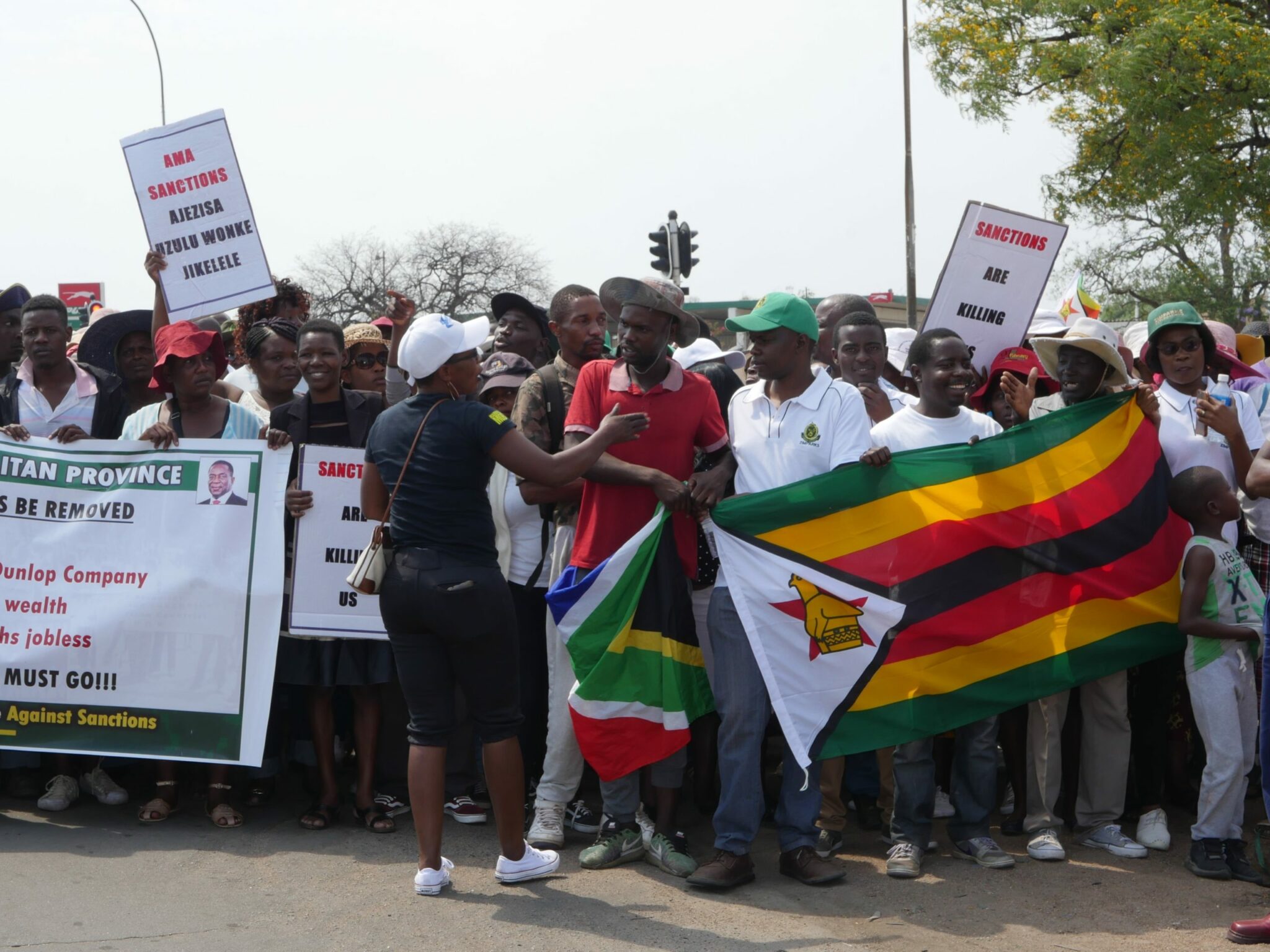The anti-sanctions march in Bulawayo went ahead as planned but under the watchful eye of the police, stationed in various spots across the city, possibly to prevent any surprises to scuttle the campaign.
Three mobilisation points: Mpopoma–D square, Number 6 traffic lights and West Commonage Police Station were set for the anti-sanctions march that started after 8 am.
The three processions, one led by Minister of State for Bulawayo Metropolitan, Judith Ncube converged at the White City Stadium around 10am, where protestors did a combined lap of protest inside the arena.
In the city centre all was calm but heavy police presence was visible at certain hotspots from the Large City Hall to White City Stadium, where a few metres away from the main event, anti-riot police had parked their water cannons.
Inside White City Stadium, close to a 1 000 people were present to partake in the campaign but mostly to enjoy the entertainment.
Before the minister of state delivered the president’s speech, solidarity messages were made by civic groups such as the Zimbabwe National Chamber of Commerce (ZNCC), Bulawayo United Residents Association, Zimbabwe Congress of Students Union (ZICOSU), youth and junior parliament.
The message of suffering, poverty, socio-economic demise in Zimbabwe was clear from the solidarity messages but the root cause was cited as “sanctions.”
However, no one touched on bad governance or the need for the government to improve its governance record.
ZNCC President of Matabeleland Chapter, Golden Muoni said the sanctions were targeted at about 84 individuals and companies but it was necessary to speak with one voice and call for their removal.
“We are here to speak with one voice and call for the sanctions removal. Industry has lost billions and billions due to sanctions. Economic sanctions are real and need cohesion from us to stop them. Industry has no access to Foreign Direct Investment and the country can’t access funds from financial institutions such as the International Monetary Fund,” he said.
Muoni noted that quite a number of industries have closed down, whose production and output affected people.
He, also cited that sanctions had to be removed because “those who are targeted are not affected but those who are not targeted are most affected.”
ZICOSU leader, Idris Chaibvu, claimed few were unaware that Zimbabwe was under siege from a geopolitical war and sanctions were an end result.
“Zimbabwe is suffering from racial subjugation, propaganda propounded by sanctions. As students we join the revolution to say sanctions must be removed,” he said.
A child MP and a youth representative dwelled on the lack of opportunities for young people despite the country is well endowed with resources.
Around 1.30 pm, Minister of State – Ncube – took to the podium to deliver President Emmerson Mnangagwa’s speech that condemned the illegal sanctions.
On behalf of the president, Ncube expressed gratitude to the SADC leadership for taking a “bold decision” on August 18 at their previous summit for heads of state in Dar Es Salam, Tanzania to declare October 25 as a day of campaigning against the “illegal” sanctions.
“Sanctions continue to cause untold suffering of our people in country. Its effects, indirectly or directly are felt by our neighbours and today we say enough is enough,” she said.
“As we meet throughout the country let it be known that we united for purpose and thank you SADC for standing with us and speaking with one voice. To Zimbabweans and distinguished guests, thank you for turning out and participating in today’s activities, it shows dedication to sanctions removal.”
The president said the sanctions were brought upon the country after embarking on its land programme.
“This was a struggle to reclaim what was ours but it had dire consequences and led to sanctions by the European Union and the United States. The Zimbabwe Democracy and Economic Recovery Act (ZIDERA) saw the country denied access to IMF and World Bank funds. The sanctions have been prohibitive and traditional sources have dried up, as Zimbabwe has not received any support but forced to operate from hand to mount since it is classified as a global risk,” Ncube read from the speech.
In his speech, the president cited the challenges that came with sanctions and cited that agriculture and mining that were backbones to Zimbabwe’s economy were suffering.
“Sanctions are neither smart nor targeted. Agricultural banks placed on sanctions list have lost billions of lines of credit…Regrettably, sanctions have made it difficult to access lines of credit in the agricultural sector which has impacted negatively on food security and agricultural growth.
“Mining sector has remained constrained due to lack of funding for recapitalisation while mining market companies were affected as assets in the US were frozen. Sanctions has slowed growth in energy sector resulting in power shortages and erratic fuel supplies,” the president said.
“Over the years, people have lost loved ones in hospitals, industry has closed, exporters denied access to market….and members of academia and the media have been denied opportunity to travel overseas,” he said.
President Mnangagwa said they wanted to make it crystal clear that the land action remained irreversible and would not betray those who fought for it.
“To ambassadors credited to this country, you live here too and the sanctions affect you too,” he said.

